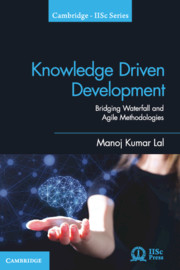Book contents
- Frontmatter
- Dedication
- Contents
- Figures
- Tables
- Foreword
- Preface
- Acknowledgements
- Overview of the Book
- 1 Knowledge Driven Development: What is the Proposition?
- 2 Project Delivery and Supporting Methodologies
- 3 Project Delivery Pain Areas and the Way Forward
- 4 Project Knowledge Model: Context and Definition
- 5 Project Knowledge Model: A Differentiator
- 6 Project Knowledge Model vs Project Documents
- 7 Extending Project Knowledge Model to Cover End-to-End Project Delivery – KDD
- 8 Extended KDD: Pre-Requirement and Post Delivery
- 9 KDD Compliance with Standards of Project Delivery
- 10 Enabling DevOps
- 11 Addressing Contemporary Concerns of Project Delivery
- 12 Helping Existing Methodologies
- 13 Technology Enablers: Tools and Automation
- 14 Suits Factory Model: Needs Cultural Change
- 15 Global Relevance of KDD: GKMF Assisting Skill Development
- 16 Lean KDD: Elimination of Requirement and Test Design?
- 17 Conclusion
- Appendix A Illustrative Non-Functional Attributes
- Appendix B Compliance of PKM with GKMF
- Appendix C Project Estimate and Business Rule/Scenario Framework
- Appendix D Inventory Relationship for Setting up of Security Questions – as per Example in Chapter 6
- Appendix E KDD: Response to Criticism
- Glossary
- References
- Index
2 - Project Delivery and Supporting Methodologies
Published online by Cambridge University Press: 20 October 2018
- Frontmatter
- Dedication
- Contents
- Figures
- Tables
- Foreword
- Preface
- Acknowledgements
- Overview of the Book
- 1 Knowledge Driven Development: What is the Proposition?
- 2 Project Delivery and Supporting Methodologies
- 3 Project Delivery Pain Areas and the Way Forward
- 4 Project Knowledge Model: Context and Definition
- 5 Project Knowledge Model: A Differentiator
- 6 Project Knowledge Model vs Project Documents
- 7 Extending Project Knowledge Model to Cover End-to-End Project Delivery – KDD
- 8 Extended KDD: Pre-Requirement and Post Delivery
- 9 KDD Compliance with Standards of Project Delivery
- 10 Enabling DevOps
- 11 Addressing Contemporary Concerns of Project Delivery
- 12 Helping Existing Methodologies
- 13 Technology Enablers: Tools and Automation
- 14 Suits Factory Model: Needs Cultural Change
- 15 Global Relevance of KDD: GKMF Assisting Skill Development
- 16 Lean KDD: Elimination of Requirement and Test Design?
- 17 Conclusion
- Appendix A Illustrative Non-Functional Attributes
- Appendix B Compliance of PKM with GKMF
- Appendix C Project Estimate and Business Rule/Scenario Framework
- Appendix D Inventory Relationship for Setting up of Security Questions – as per Example in Chapter 6
- Appendix E KDD: Response to Criticism
- Glossary
- References
- Index
Summary
This chapter introduces the reader to the technology and domain aspects of an industry and then details it for IT industry. It elaborates the knowledge-based nature of the IT industry and the factors limiting its natural movement to a process-based industry. It then provides a general overview of the IT project delivery. It also lists project delivery methodologies, standards, guidelines and frameworks used in various scenarios to manage the IT projects.
IT Industry from Technology and Domain Perspective
Information Technology (IT) is nascent industry. Let us look at various industries and their ages:
1. Agriculture (12,000 years old)
2. Modern Banking Industry (700 years old)
3. Modern Insurance Industry (350 years old)
4. Modern Pharmaceutical Industry (200 years old)
5. Modern Steel Industry (150 years old)
6. Information Technology (60 years old)
Industries have matured with research and experience contributing to enrichment of knowledge in the industry. Old industries have matured enough to have standard and well-defined processes for delivery of various projects. Also, their processes are not generic but detailed and prescriptive. For example, in an agricultural plantation, separation between two plants is well-defined and prescriptive. It primarily depends on plant types. But this would not have been the case a few thousand years ago. At that time the practice must have gone through several phases of research and experience to come to the optimal separation between two plants. Agriculture, then, could be termed as a knowledge-based industry but now it is a process-based industry.
One of the greatest revolutions in the maturity of industries has been the Industrial Revolution where mechanisation proved immensely beneficial for mass production. Another revolution of a similar or even greater scale is being brought about by the introduction of computers (including smartphones and apps), which has started impacting every aspect of our lives. Computers have brought in the IT industry to the fore.
The IT industry itself is a new industry and is barely 60 years old. IT is a support industry which assists other industries. Predominantly, IT automates manual, repeatable processes via software.
An industry has two components at the highest level. These are the implements and the way of using the implements effectively. The implement in IT is ‘technology’ and the knowledge about how to effectively use an implement is ‘domain’.
Information
- Type
- Chapter
- Information
- Knowledge Driven DevelopmentBridging Waterfall and Agile Methodologies, pp. 30 - 45Publisher: Cambridge University PressPrint publication year: 2018
